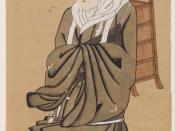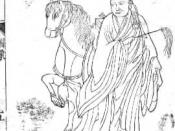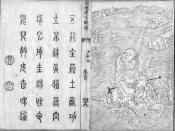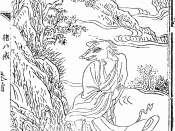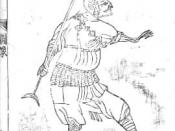Have you seen Alakazam? It's a direct adaption of Hsi Yu Chi. Of course, it's been simplified a great deal since it is directed toward young children, but it shows how much Hsi Yu Chi influences today's media. And what about Dragonball? Have you seen that? The character Son Goku could be a direct descendant of Sun Wu Kung! They both use the same sort of weapon, they are both well known for flying on clouds, and to top it off, they have the same name (except that Goku's is in Japanese, but they mean the same thing)! In the Fifth Century AD, a Chinese Buddhist priest named Hsuan Tsang made a journey to India. After his journey, he wrote about his travels, the people he had met and the differences he observed from kingdom to kingdom. His book was called 'Hsi Yu Chi' (The Record of a Journey To The West).
Little did the Tang Dynasty Monk realize that his book would father one of the most well known works of Chinese literature. Eleven centuries later, another edition of 'His Yu Chi' was written. When it was released, the new 'Hsi Yu Chi' was considered as a disgrace to the community of writers. This ludicrous work which lacked philosophical depth and profundity was not only a satire of the Chinese Imperial System and Chinese bureaucracy, but it was an insult to the two most dominant religions at the time, Buddhism and Taoism. The writer had taken the text 'Hsi Yu Chi' and turned it into what was considered at the time, utter nonsense.
No wonder it was released anonymously.
Until very recently, an unabridged edition of 'Hsi Yu Chi' has not been available to Western Readers. Professor Yu has done a marvelous job translating the long book (one hundred chapters). The Journey To The West (which is want I will refer to it as from now on) portrays the world as one which is inhabited by demons, monsters, dragons, fairies, magic and various deities from Chinese Mythology and pushes the real hero of The Journey Hsuan Tsang into a corner and introduces a new hero, a monkey named Sun Wu K'ung, who is a disciple of the Tang Monk. Hsuan Tsangs other disciples are Chu Wu Neng, who is pig-man and Sha Wu Ching who is a water demon.
Most scholars agree that The Journey To The West can be divided into these four systematic parts. (In chronological order,) one, the birth of the Sun Wu K'ung, his attainment of magical abilities, his crimes in Heaven and his subdual by Tathagata Buddha. Two, Hsuan Tsang's family background, his birth and his commitment in Journeying to India to obtain Buddhist Scriptures. Three, the actual journey, where Hsuan Tsang adopts first Wu K'ung as a disciple, then adopts the other two later on. This third part is the longest in the book and is full of episodes where the pilgrims encounter people harassed by demons and then practicing exorcism to subdue the demons. Four, the arrival to Tathagata's monastery in India, the obtaining of Buddhist Scriptures and the promoting of the pilgrims.
When one takes a first glance at the book, it seems to be a text of great depth and philosophical meaning. The fact that very little profundity is found in the book is what I think drives scholars to make their observations. The book is very straight forward and littered with short poetry verses throughout. We are soon introduced to the main character, the monkey who is born from the embryo of a rock. The book describes the rock as having nine perforations and eight holes to correspond with the nine palaces of heaven and the eight trigrams. I could find absolutely no reason why the rock would have to have markings which correspond with divine symbols and I am sure that the author meant nothing by writing that they do, but apparently, many scholars have written long and tedious essays relating to just the description of the rock. I believe that the author simply wanted to see people ponder over his work and eventually tell them all that it was complete nonsense.
The book next tells of exploits of the overly ambitious monkey who is named Wu K'ung, his attempts to subdue the emperor of Heaven and his ignorance. Eventually, Wu K'ung becomes too big headed for his own good and is subdued by Tathagata Buddha who traps him under a mountain.
As I get into about the twelfth chapter, I get the impression that The Journey To The West represents more the human struggle for enlightenment than the journey for scriptures. The concept of bringing the people scriptures is almost lost completely In the story and instead, we have four pilgrims who together represent the Human Vehicle, where Hsuan Tsang represents the rational human mind, the one who remembers the origin and the Dharma. Wu K'ung represents the human ego, which is willing to follow trends and be easily tempted, but loathes self pity. Wu Neng represents the greed for material objects such as money and food, and the attachment to lives 'coarse' passions. Wu Ching can be called Mister Faithful, as he is strong, but always watches out for the Dharma.
The three disciples of Hsuan Tsang have a lot in common despite their ugliness. All three once held office in Heaven, but for some crime, they were all punished. Sun Wu K'ung had waged war on Heaven and attempted to force the Emperor of Heaven to abdicate, Chi Wu Neng had 'dallied' with the Goddess of the Moon when he was drunk one night and Sha Wu Ching was punished for being careless with one of the Emperor's crystal bowls and smashing it to atoms. The three disciples all appealed to The Lady Boddhisatva Kuan Yin (the savior of the Chinese pantheon, equivalent to Jesus) to save them from their punishments. Kuan Yin tells them that they can obtain merit by obtaining the 'right fruit' (i.e. Buddhism) and assist the Tang Monk Hsuan Tsang on his Journey to India. The final most obvious similarity between the three disciples is the similarity in their names. (In Chinese, the surname comes first.) Sun Wu K'ung means Monkey Aware of Vacuity, Chu Wu Neng means Pig Awakened to Power and Sha Wu Ching means Sand Awakened to Purity.
Sun Wu K'ung really lives up to his name in The Fourteenth Chapter. At this point, Wu Neng and Wu Ching have not yet been taken in by Hsuan Tsang and the two pilgrims are confronted by six bandits who demand their belongings. Wu K'ung casually asks for the bandits' names whereupon he is replied "Let's tell you then, one of us is named Eye that Sees and Delights, another, Ear that Hears and Rages, another, Nose that Smells and Loves, another, Tongue that Tastes and Desires, another, Mind that Perceives and Covets, and another, Body that Bears and Suffers." On hearing this, Wu K'ung dismisses the bandits as "nothing but six hairy brigands" before "knocking the bean curd out of them" (i.e. Bashing their brains out.) The clever part comes when Hsuan Tsang scolds the Monkey for committing a crime. Hsuan Tsang does not understand as Wu K'ung does, how the five senses and the mind can weaken the Dharma since the Tang Monk is of Mortal Stock (non divine). As the Ego, Wu K'ung can not tolerate criticism of any sort and flies away in a fit of fury. It sounds so straight forward and simple and yet, I only noticed it after reading the book for the third time.
As I was reading this book, I was constantly bothered at how Wu K'ung was able to so easily cause havoc in Heaven and yet, when he became the disciple of Hsuan Tsang, he had so much trouble in saving his master from demons who were obviously insignificantly powerless compared with the forces of Heaven. The book does not explain this inconsistency so the best explanation I could give for it is that in the five hundred years that Wu K'ung spent trapped under the mountain, magic improved greatly, the way that technology does today. So when Wu K'ung was finally released by Hsuan Tsang, the powers which made him supreme to Heaven before, were now quite obsolete and powerless compared to the new magic. Compare this with a person who buys the most powerful computer available and locks himself in a room for ten years to write a novel. When he comes out, the computer which was once the most powerful, is outdated by models which are much faster. I am surprised that Yu did not mention this in his comprehensive introduction because I thought it to be so obvious.
Overall, The Journey To The West is highly entertaining and introduces a lot of new concepts into my life. I advise that anyone who reads it should also have a book on Chinese Mythology at hand as it involves many characters from The Chinese Pantheon. The poetry verses are some of the best I have ever read (though I'm told it sounds better in Chinese because then it actually rhymes).
Yu's translating is exceptional as each volumes have references at the back which briefly explain certain concepts which might not be familiar to Western Readers. It is not a story with suspense, but rather, it has on the whole, a predictable plot which includes many little plot twists along the way. The humour, though out of date, is still very cute and is suddenly funny after the entire book has been read.
